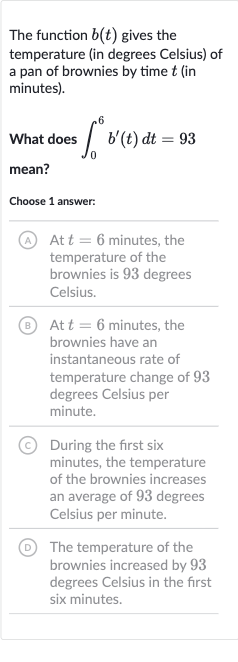AI tutor
Welcome to Bytelearn!
Let’s check out your problem:

The function gives the temperature (in degrees Celsius) of a pan of brownies by time (in minutes).What does mean?Choose answer:(A) At minutes, the temperature of the brownies is degrees Celsius.B) At minutes, the brownies have an instantaneous rate of temperature change of degrees Celsius per minute.(C) During the first six minutes, the temperature of the brownies increases an average of degrees Celsius per minute.(D) The temperature of the brownies increased by degrees Celsius in the first six minutes.
Full solution
Q. The function gives the temperature (in degrees Celsius) of a pan of brownies by time (in minutes).What does mean?Choose answer:(A) At minutes, the temperature of the brownies is degrees Celsius.B) At minutes, the brownies have an instantaneous rate of temperature change of degrees Celsius per minute.(C) During the first six minutes, the temperature of the brownies increases an average of degrees Celsius per minute.(D) The temperature of the brownies increased by degrees Celsius in the first six minutes.
- Given Integral Information: We are given the integral of the derivative of the temperature function with respect to time , from to minutes, and it equals . This integral represents the total change in temperature over the time interval from to minutes.
- Interpretation of Integral: The integral of a derivative function over an interval gives us the net change in the original function over that interval. In this case, it tells us how much the temperature of the brownies has changed from the start time to the end time minutes.
- Calculation Explanation: The value of obtained from the integral does not represent the temperature at a specific time (which would be given by itself, not its derivative). Nor does it represent an instantaneous rate of change at a specific time (which would be given by at that time). It also does not represent an average rate of change per minute over the interval, as that would require dividing the total change by the number of minutes.
- Final Conclusion: Therefore, the correct interpretation of the integral is that the temperature of the brownies increased by a total of degrees Celsius over the first six minutes. This corresponds to option .
More problems from Evaluate two-variable equations: word problems
QuestionGet tutor help
QuestionGet tutor help
QuestionGet tutor help
QuestionGet tutor help
QuestionGet tutor help
QuestionGet tutor help
QuestionGet tutor help
QuestionGet tutor help
QuestionGet tutor help
